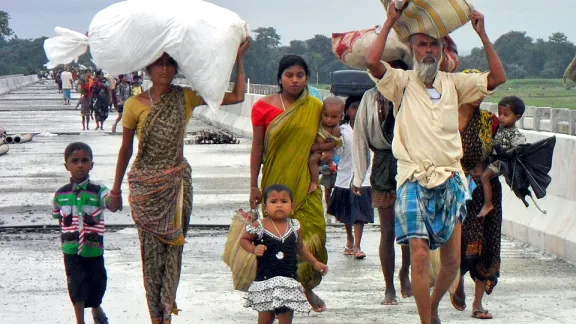
Villagers seek refuge in relief camps following ethnic violence in the Chirang district of Assam state. © Reuters, courtesy Trust.org - AlertNet
Interfaith Seminars to Equip Leaders with Conflict Transformation Skills
Member churches of The Lutheran World Federation (LWF) are spearheading efforts to restore peace between ethnic communities in Assam, India, following violence that has left 80 dead and forced hundreds of thousands to flee their homes.
Violence erupted between the ethnic Bodo community and migrant Muslims in Assam when four youths were killed in July. While there have been some longstanding issues between the groups, they have mostly lived side-by-side peacefully and the recent deadly clashes have taken many villagers by surprise.
“Our village was very peaceful. We have been living with the Muslim brothers and sisters as neighbors,” said Hira Mosahary, 39, a member of the Northern Evangelical Lutheran Church (NELC) congregation in Goladangi. She and her family lost their home when their village was attacked on 21 July.
NELC Bishop Emeritus Nityananda Borgoary added: “The Muslims and the Bodos have lived together for years and no one even imagined this [communal clash] would happen.”
In response, the United Evangelical Lutheran Church in India (UELCI)–the national Lutheran communion–is coordinating a comprehensive peace process through NELC and the Inter-Church Peace Mission (ICPM).
In early August church leaders led a peace mission to relief camps in Chirang and Kokrajhar, where displaced Bodos and Muslims have been staying since the flare-up of violence, expressing solidarity with the residents and assuring them of their prayers.
The peace process, which will continue until December 2013, includes a study of the underlying causes of the conflict, bringing leading figures from both communities together in a mediation process.
There will be efforts to convince members of the Bodos community to return to their homes, and interfaith seminars on peace and conflict to facilitate awareness around the realities of living in a pluralistic society.
“Peacemaking initiatives, conflict transformation and crisis management [are] new to the church leaders of lower Assam,” said Dhojen Borgoary, general secretary of the Boro Christian Council.
“Church leaders need to be trained in this regard so that they can give better input to manage this type of crisis and to interpret God’s love into action.”
Those such as Mosahary who were forced to seek refuge in the relief camps underline the need for such efforts.
“I [see] the village people in pain, especially the children and old people, who [are] struggling to adjust to the relief camps. We need security and peace, which will help us to go back to our village, to restore our lives,” she said.
In a two-pronged effort, the churches also are working to meet material needs in the relief camps.
Once the security curfew in the area is lifted, the national Lutheran communion will partner with NELC as well as Lutheran World Service India Trust, an associate program of the LWF’s Department for World Service, and ICPM to distribute food, clothing, hygiene kits, sleeping mats and other basic household items to 2500 families in camps in Bongaigaon, Gossaigoan and Kokrajhar.
“Both Bodo and Muslim communities are affected [by the] Assam ethnic violence situation and in both the camps people are waiting to receive the food and non-food items [to meet] their daily needs,” noted Jacob Tanty, a member of the Evangelical Lutheran Church in Himalayan States who is coordinating the relief response on behalf of UELCI.
UELCI executive secretary Rev. Dr Augustine Jeyakumar appealed to LWF member churches to pray for the restoration of peace and to contribute towards the relief effort to help save lives.
(590 words)


